初中英语状语从句及练习题(含答案)合集
- 格式:docx
- 大小:156.43 KB
- 文档页数:9
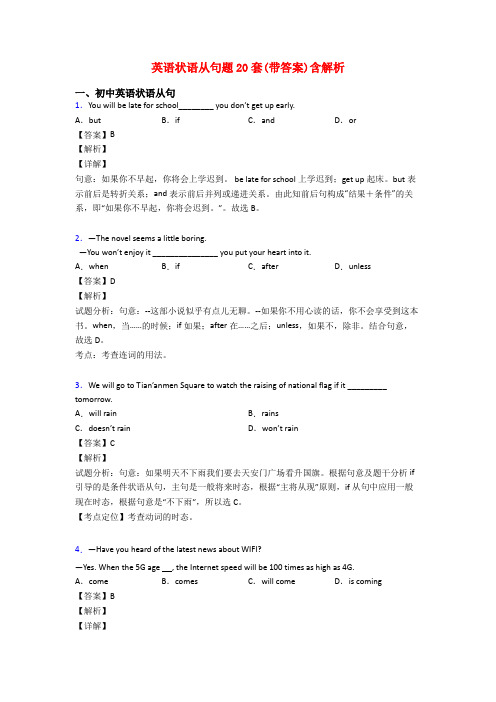
英语状语从句题20套(带答案)含解析一、初中英语状语从句1.You will be late for school________ you don’t get up early.A.but B.if C.and D.or【答案】B【解析】【详解】句意:如果你不早起,你将会上学迟到。
be late for school上学迟到;get up起床。
but表示前后是转折关系;and表示前后并列或递进关系。
由此知前后句构成“结果+条件”的关系,即“如果你不早起,你将会迟到。
”。
故选B。
2.—The novel seems a little boring.—You won’t enjoy it _______________ you put your heart into it.A.when B.if C.after D.unless【答案】D【解析】试题分析:句意:--这部小说似乎有点儿无聊。
--如果你不用心读的话,你不会享受到这本书。
when,当……的时候;if如果;after在……之后;unless,如果不,除非。
结合句意,故选D。
考点:考查连词的用法。
3.We will go to Tian’anmen Square to watch the raising of national flag if it _________ tomorrow.A.will rain B.rainsC.doesn’t rain D.won’t rain【答案】C【解析】试题分析:句意:如果明天不下雨我们要去天安门广场看升国旗。
根据句意及题干分析if 引导的是条件状语从句,主句是一般将来时态,根据“主将从现”原则,if从句中应用一般现在时态,根据句意是“不下雨”,所以选C。
【考点定位】考查动词的时态。
4.—Have you heard of the latest news about WIFI?—Yes. When the 5G age , the Internet speed will be 100 times as high as 4G.A.come B.comes C.will come D.is coming【答案】B【解析】【详解】句意:——你听说过无线网络的最新消息吗?——是的。

(英语)初中英语状语从句真题汇编(含答案)及解析一、初中英语状语从句1._______ you do in the future, you should try your best to do it well.A.However B.Whenever C.Whoever D.Whatever【答案】D【解析】试题分析:句意:无论你将来做什么,你都应该尽你的最大努力把它做好。
however 然而,无论怎样;whenever 无论什么时候;whoever 无论是谁;whatever 无论什么。
根据句意可知,这里表示无论你做什么,所以应该用whatever。
考点:考查连词。
2.Many people do not realize the importance of health ______ they have fallen ill.A.until B.while C.when D.after【答案】A【解析】试题分析:句意:一些人直到失去了健康才意识到它的重要性。
本题考查的是not…until 句型,“直到……才”。
For为了;but 但是;as 作为。
故选A。
考点:考查连词的用法。
3.My English teacher has taught English she came to the school.A.since B.as C.when D.for【答案】A【解析】【详解】考查连词辨析,句意:我的英语老师自从来到这个学校就教英语.结合语境推断句意是"我的英语老师自从来到这个学校就教英语.",此句中的谓语动词用了现在完成时,本题设空处后面的时间状语从句用了一般过去时,所以结合句意用现在完成时的标志词since引导,故选A4.--- I wonder if Tina to China next week.--- If it ,she will come.A.will come;won’t rain B.comes;doesn’t rainC.comes;won’t rain D.will come;doesn’t rain【答案】D【解析】【详解】句意:——我想知道蒂娜下周是否会来中国。

【英语】英语状语从句题20套(带答案)含解析一、初中英语状语从句1.The nurse won't leave her patients________she's sure they are all taken good care of. A.unless B.because C.since D.if【答案】A【解析】句意:这个护士不会离开她的病人,除非她确定病人们都被照顾得很好。
because因为,引导原因状语从句;since自从,引导时间状语从句;既然,引导原因状语从句;if如果,引导条件状语从句;unless除非,如果不,引导条件状语从句。
根据句意可知,这里考查的是从属连词unless,故选A。
2.I have to leave now __ I can catch the last bus.A.so that B.because of C.until D.as soon as【答案】A【解析】试题分析:so that以便,所以;because of因为,由于;until直到;as soon as一……就……。
句意:为了赶上末班车,我现在必须离开了。
结合语境可知选A。
考点:连词辨析点评:连词在句子中主要起联系上下文的作用,他们之间的区别就是表示逻辑关系的不同,所以在解题时先要理解上下文含义,然后根据上下文逻辑关系选择合适的连词。
连词的用法都比较多,语义之间还有交叉,熟记其基本应用规则,了解其区别,注意固定搭配对象,是做好此类题型的关键。
3.— When did you go to bed last night?— ____________ I finished my homework.A.Until B.Not until C.When D.While【答案】B【解析】not …until 表示直到…才,与短暂性动词连用,故选B4.You'd better get home earlier today we can go out for a big meal.A.in order to B.such that C.so that D.in order【答案】C【解析】句意:你最好今天早点回家,这样我们就可以出去吃大餐了。
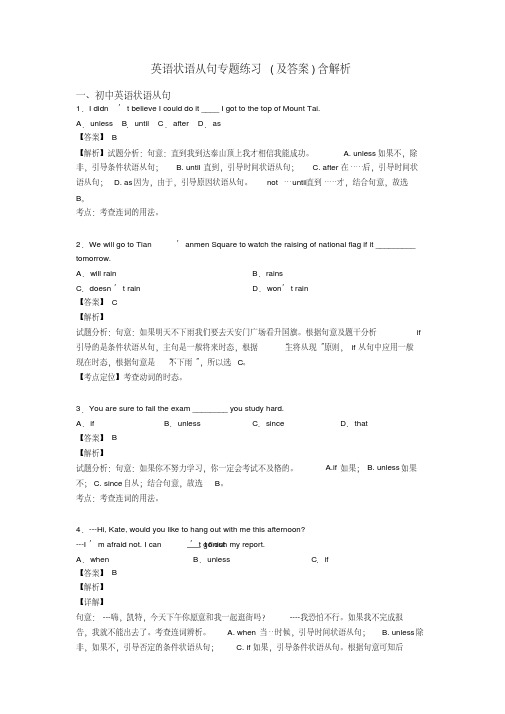
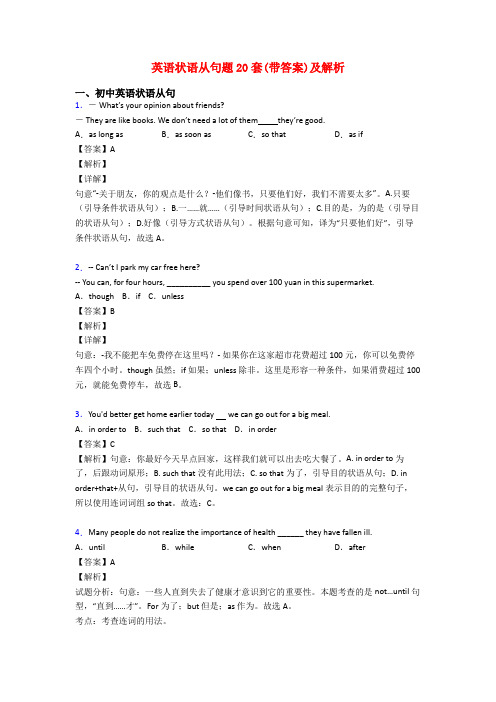
英语状语从句题20套(带答案)及解析一、初中英语状语从句1.-What’s your opinion about friends?-They are like books. We don’t need a lot of them they’re good.A.as long as B.as soon as C.so that D.as if【答案】A【解析】【详解】句意“-关于朋友,你的观点是什么?-他们像书,只要他们好,我们不需要太多”。
A.只要(引导条件状语从句);B.一……就……(引导时间状语从句);C.目的是,为的是(引导目的状语从句);D.好像(引导方式状语从句)。
根据句意可知,译为“只要他们好”,引导条件状语从句,故选A。
2.-- Can’t I park my car free here?-- You can, for four hours, __________ you spend over 100 yuan in this supermarket. A.though B.if C.unless【答案】B【解析】【详解】句意:-我不能把车免费停在这里吗?- 如果你在这家超市花费超过100元,你可以免费停车四个小时。
though 虽然;if 如果;unless 除非。
这里是形容一种条件,如果消费超过100元,就能免费停车,故选B。
3.You'd better get home earlier today we can go out for a big meal.A.in order to B.such that C.so that D.in order【答案】C【解析】句意:你最好今天早点回家,这样我们就可以出去吃大餐了。
A. in order to 为了,后跟动词原形;B. such that没有此用法;C. so that为了,引导目的状语从句;D. in order+that+从句,引导目的状语从句。

(英语)初中英语状语从句专项训练100(附答案)含解析一、初中英语状语从句1.They will lose the game _______ they try their best.A.unless B.once C.since D.after【答案】A【解析】【详解】试题分析:句意:他们会输掉比赛的,除非他们尽自己最大的努力。
lose the game 输掉比尽最大的努力。
A. unless 除非; B. once 一次;C. since 因为; D. after赛,try one’s best在…之后,根据题意可知此句是unless引导的条件状语从句,故选A。
2.The Italian woman didn’t feel a culture shock____it was her first time to Shanghai. A.though B.since C.if D.when【答案】A【解析】句意:这个意大利妇女没有感到一种文化冲击,尽管她是第一次来上海。
A. though尽管;B. since自从;C. if 是否,如果;D. when当---时候;根据The Italian woman didn’t feel a culture shock这个意大利妇女没有感到一种文化冲击,和it was her first time to Shanghai.她是第一次来上海之间用though 引导让步关系状语从句;故选A3.—I’m afraid the class has begun.—Don’t worry. It ________ until the bell ________. A.doesn’t begin; ring s B.won’t begin;will ringC.won’t begin; rings D.doesn’t begin; will ring【答案】C【解析】试题分析:句意:-恐怕课已经开始了。


【英语】英语状语从句题20套(带答案)一、初中英语状语从句1.---I’m afraid e-books might be bad for our eyes.---Hmm, but they will be helpful for us_________we put them to good use.A.as soon as B.as long as C.even though D.so that【答案】B【解析】【详解】句意“-恐怕电子书对我们的眼睛有害。
-但是只要我们合理使用他们,他们就对我们有帮助”。
A.一……就……(引导时间状语从句);B.只要(引导条件状语从句);C.尽管(引导让步状语从句);D.目的是,为的是(引导目的状语从句)。
根据句意可知,译为“只要我们合理使用他们”,表示条件,故选B。
2.__________ you have tried it on, you can’t imagine how pretty the new style skirt is. A.Because B.Although C.Unless D.When【答案】C【解析】本题的含义是如果你不尝试一下,你将不能想象一下这件新款式的裙子有多么漂亮,unless表示如果不的意思,故本题选C。
3.— What do you think of your junior middle school life?— I think it is colorful, I’m always busy.A.though B.while C.until D.because【答案】A【解析】【详解】本题考查:副词辨析。
选项分析:A. though虽然,尽管。
B. while虽然;然而。
C. until 在…以前;直到…时。
D. because因为。
综合分析前后句,可知此处填 though最合适,完整句意为:— What do you think of your junior middle school life?你觉得你的初中生活怎么样?—I think it is colorful, though I’m always busy.我认为它是丰富多彩的,虽然我总是很忙。

【英语】中考英语状语从句题20套(带答案)及解析一、初中英语状语从句1.一Last night I went to a concert of Chinese folk music. Erquan Yingyue was so sad but beautiful that I sensed a strong sadness and pain under the beauty.一So it was. The musician who played it last night to play the erhu since hevery young.A.learned; was B.has learned; amC.has learned; was D.learned; has been【答案】C【解析】句意:------昨晚我去听了一场中国民间音乐会。
二胡映月是如此悲伤,但美丽,在其美丽的下面我感觉到一种强烈的悲伤和痛苦。
-------的确是这样。
昨晚演奏的音乐家从小就学会了演奏二胡。
Since引导的时间状语从句,从句是一般过去式,主句用现在完成时;故选C。
2.I won't go he comes back.A.until B.while C.when D.why【答案】A【解析】句意:直到他回来,我才走。
A. until 直到; B. while当---时候; C. when当---时候; D. why为什么;not---until--- 直到---才---;故选A3.一When did you leave your office yesterday?一 I finished the project.A.Until B.While C.When D.Not until【答案】D【解析】句意:昨天你什么时候离开你的办公室的?——直到我完成那个任务。
本题考查连词。
A. Until 直到···时候才结束,要与延续性动词连用;B. While 当···时候;C. When 当···时候;D. Not until直到···时候才开始,与非延续性动词连用;句子中finished(完成)是非延续性动词,故选D4.Rony will get a chance t o work in this company ________ he doesn’t pass the interview. A.unless B.when C.if D.after【答案】A【解析】【详解】句意“除非罗尼没有通过面试,否则他将有机会在这个公司上班”。

状语从句练习( ) 1. I won't believe you___ I have seen it with my own eyes.A. beforeB. untilC. afterD. when( )2.He ___ home ___ she was satisfied ___ his answer yesterday.A. didn't go; until; withB. wasn't go; after; toC. doesn't go; before; withD. didn't go; until; to( ) 3. He ___ back until the work ___ done.A. isn't; will beB. isn't; isC. won't be; will beD. won't be; is( ) 4. They didn't start the work ___ their teacher came back.A. until B. while C. as soon as D. if( )5. Tom will call me as soon as he ___ Shanghai.A. arrivesB. will reachC. arrives inD. get to( )6. I'm sure he'll come to see me before he ___ Beijing.A. will leaveB. is leavingC. leaveD. leaves( )7. Tom has got a watch. He ___ it for two years. It _______ by his father.A. has bought; was boughtB. has got; is bought ,C. was bought; has bought .D. has had; was bought "'( )8. When he got to the station, the train ___.A. left B. had left C. leaves D. has left( ) 9. The boy told his father what he ___ in the street.A. sawB. have seenC. had seenD. see( ) 10. We ___ TV when the telephone ____.A. watched; was ringingB. were watching; rangC. watch; ringsD. are watching; rang ( ) 11. I ___ you for a long time. Where ___ you ___?A. didn't see; did; goB. didn't see; have; goneC. haven't seen; have; beenD. haven't seen; have; gone( ) 12. Tom___ China for 3 years.A. has beenB. has been inC. has been toD. has been at( ) 13. -Hello! May I speak to Bob?-Sorry, but he ___ for a month.A. had been awayB. was leftC. leftD. has been away( )14. Betty didn't go to see the film yesterday ___ she was ill.A. because B. but C. until D. if( )15. ___ he came to study in the university, he has made much progress in the study of English.A. WhileB. WhenC. SinceD. After( )16. I'd like to go swimming _____ the water is not too cold.A. for B. unless C. if D. whether( ) 17. There are ___ many league members in class 2 ___ in Class 4.A. both; andB. 'so; thatC. either; orD. as; as( )18. Suzhou is not ____ beautiful ____ Hangzhou.A. as; than B. so; as C. even; than D. /; than( ) 19. I want to know ___ she is going to see a film.A. if B. that C. what D. which ( )20. I'll go to see the film with you___I have time this evening.A. whether B. so C. if D. when( ) 21. ___ you study harder, you'll never pass the final exam.A. If B. Until C. Unless D. Except( ) 22. Although it was raining,-- still worked in the fields.A. but they B. and they C. they D. and yet they( )2 3 .___ she is very old, ___ she can still work eight hours a day.A. Because; soB. Though; butC. As; yetD. Though; yet( ) 24. Please answer the question in a loud enough voice ___ all the class may hear.A. so, thatB. orC. in order thatD. and( ) 25.I hurried___I wouldn't be late for class.A. so B. so that C. if D. unless ( ) 26.The dictionary is so expensive ___ I can't buy it.A. because B. when C. that D. if( ) 27. I got there ___ late ___ I didn't see him.A. too; to B. such; that C. so; that D. so; as( ) 28. He has___ an interesting book that we want to read it.A. so B. such C. the same D. as答案:1-5BADAC 6-10DDBCB 11-15CBDAC 16-20CDBAC 21-25CCDCB 26-28CCB宾语从句练习1. I don’t know _____ he will come tomorrow. _____ he comes, I’ll tell you.A. if; WhetherB. whether; WhetherC. if; ThatD. if; if2. Could you tell me ____ the radio without any help?A. how did he mendB. what did he mendC. how he mendedD. what he mended3. Can you tell me how many English words ____ since 1996?A. have you learnedB. did you learnC. you have learnedD. you learned4. Miss Li wants to know _____ next week.A. when my uncle leaves B. when will my uncleC. where my uncle will stayD. where does my uncle stay5. I don’t know ____ Jane was late for school this morning. A. who B. what C. whom D. why6. They don’t know ____ their presents are. A. when B. why C. what D. how7. Mike asked the girl in the shop ____ the watch ____ cheap enough.A. that; is B. if; was C. that; was D. whether; is8. I think he ____ back next week.A. comeB. will comeC. cameD. has come9. Xiao Mao told me he ____ a film with his mother the next day.A. would seeB. will watchC. would lookD. will see10. Could you tell me if it ____ tomorrow?A. rainB. will rainC. rainingD. rains11. He said that he ____ speak a little English when he was five. A. might B. would C. could D. can12. I want to know if they ____ the spring sports meeting next month. If they ____ it,I must get ready for it. A. hold; will holdB. will hold; hold C. hold; holdD. will hold; will hold13. –Excuse me. Could you tell me ____? -Certainly.A. when can I get to the stationB. I can get to which stationC. which station can I get toD. how I can get to the station14. –What did your mother say, Tom? -She asked me why ____.A. my sister cryingB. my sister was cryingC. is my sister cryingD. was my sister crying15. I wonder what time _____ arrive. A. does the trainB. will the train C. the trainD. the train will16. Did you hear _____? A. what did I sayB. what I saidC. that I saidD. I said which17. Can you tell me which room _____?A. does he live inB. does he livesC. he lives inD. he lives18. The little boy often asks me what ______?A. will our life of tomorrowB. will our life tomorrow be likeC. our life of tomorrow likeD. our life of tomorrow will be like19. Do you really know _____ used?A. how widely English isB. how wide is EnglishC. English is how widelyD. how is English wide20. Would you please tell me ______ with Peter? He looks unhappy.A. what’s the matterB. what wrong isC. the wrong is whatD. what wrong it was21. –Excuse me, where _____? Do you know? -Yes. I know where _____?A. Jim lives; he livesB. does Jim live; do he liveC. Jim lives; does he liveD. does Jim live; he lives22. I didn’t know _____ and _____.A. what’s his name; how old he isB. what his name was; how old he wasC. what his name is; how is he oldD. that was his name; he was how old23. My friend hasn’t decided _____ on a trip to Wuxi on holiday.A. if he goesB. when will he goC. if he’ll goD. where he go24. Did you ask her what ______ outside?A. was happened to himB. he had happenedC. he happenedD. had happened to him25. The man in the shop asked the woman _____A. which kind does she likeB. which kind she isC. which kind is she likesD. which kind she likes26. No one told us _____, so we need your help. A. how should we doB. what should wedo C. how to do it D. what to do it27. I don’t know ______ the day after tomorrow.A. when does he comeB. how will he comeC. if he comesD. whether he’ll come28. –Could you tell me _____?-Yes, they _____ to the library.A. where are the twins; have beenB. where the twins are; have goneC. where were the twins; have been D where the twins were; have gone答案:1-5DCCCD 6-10CBBAB 11-15CBDBD 16-20BCDAA 21-25DBCDD26-28CDB定语从句练习1.I've read all the books you gave me.A.which B.them C.what D.that2.Tellus about the people and the places are different from ours.A.that B.who C.which D.whom 3.Mr John said that Suzhou was the first city he had visited in China. A.that B.where C.which D.what 4.The TV play I watched last night is the best one I have watched this year.A.whichB.whatC.whoseD.that5.Is this the museum you visited the other day?A.thatB.whereC.in whichD.the one6.There is no difficulty can't be overcome in the world.A.thatB.whichC.whoD.what7.This was the supermarket I bought this kind of tin.A.whereB.thatC.whoD.which8.The house we live is not big.A.in thatB.whichC.in whichD.that9.Beijing, is the capital of China,is a beautiful city.A.that B.it C.whichD./10..She was no longer the woman she was.A.that B.which C.what D.who11.That's the hotel last year. A.which we stayed B.at that we stayedC.Where we stayed atD.where we stayed12.You've made the same mistake you made last time.A.asB.likeC.whichD.that13.It is not such an interesting magazine I thought.A.as B.that C.which D./14. you know,he is a famous musician.A.As B.which C.That D./15.Mr Zhou, native language was Chinese,could read and write several foreign languages.A.whoseB.hisC.whichD.that16.Do you know the actor you saw playing Hamlet is now doing King Lear?A.whoB.whomC.whoseD.which17.I took my friend to the Summer Palace, we had some photos taken.A.whereB.whichC.thatD./18.We all remember the days we studied together at school.A.whichB.thatC.whenD./19.I showed the doctor the place I felt the pain.A.thatB.whichC.whereD.when20.I'm one of the students well in English in my class.A.who doesB.who doC.which doesD.who did21.This is the babytomorrow.A.after whom I shall lookB.whom I shall look afterC.whose I shall look afterD.after whom I shall look after22.This is the fastest train is going to Nanjing.A.thatB.whatC.whereD./答案:1-5DAADA 6-10AACCA 11-15DDBAA 16-20AACCB21-22BA。

状语从句练习( ) 1. I won't believe you I have seen it with my own eyes.A. beforeB. untilC. afterD. when( )2.He home she was satisfied his answer yesterday. A. didn't go; until; with B. wasn't go; after; toC. doesn't go; before; withD. didn't go; until; to( ) 3. He back until the work done.A. isn't; will beB. isn't; isC. won't be; will beD. won't be; is( ) 4. They didn't start the workA. untilB. whileC. as soon asD. if ( )5. Tom will call me as soon as he their teacher came back.Shanghai.A. arrivesB. will reachC. arrives inD. get to( )6. I'm sure he'll come to see me before he Beijing.A. will leaveB. is leavingC. leaveD. leaves( )7. Tom has got a watch. He it for two years. It by his father.A. has bought; was boughtB. has got; is bought ,C. was bought; has bought .D. has had; was bought "'( )8. When he got to the station, the train .A. leftB. had leftC. leavesD. has left( ) 9. The boy told his father what he in the street.A. sawB. have seenC. had seenD. see( ) 10. We TV when the telephone .A. watched; was ringingB. were watching; rangC. watch; ringsD. are watching; rang( ) 11. I you for a long time. Where you ?A. didn't see; did; goB. didn't see; have; goneC. haven't seen; have; beenD. haven't seen; have; gone( ) 12. Tom China for 3 years.A. has beenB. has been inC. has been toD. has been at( ) 13. -Hello! May I speak to Bob? -Sorry, but he for a month.A. had been awayB. was leftC. leftD. has been away( )14. Betty didn't go to see the film yesterday she was ill.A. becauseB. butC. untilD. if( )15. he came to study in the university, he has made much progress in the study of English.A. WhileB. WhenC. SinceD. After( )16. I'd like to go swimming the water is not too cold.A. forB. unlessC. ifD. whether( ) 17. There are many league members in class 2 in Class 4.A. both; andB. 'so; thatC. either; orD. as; as( )18. Suzhou is not beautiful Hangzhou.A. as; thanB. so; asC. even; thanD. /; than( ) 19. I want to know she is going to see a film.A. ifB. thatC. whatD. which( )20. I'll go to see the film with you I have time this evening.A. whetherB. soC. ifD. when( ) 21. you study harder, you'll never pass the final exam.A. IfB. UntilC. UnlessD. Except( ) 22. Although it was raining,-- still worked in the fields.A. but theyB. and theyC. theyD. and yet they( )2 3 . she is very old, she can still work eight hours a day.A. Because; soB. Though; butC. As; yetD. Though; yet( ) 24. Please answer the question in a loud enough voice all the class may hear.A. so, thatB. orC. in order thatD. and( ) 25.I hurried I wouldn't be late for class.A. soB. so thatC. ifD. unless( ) 26.The dictionary is so expensive I can't buy it.A. because B. when C. that D. if( ) 27. I got there late I didn't see him.A. too; toB. such; thatC. so; thatD. so; as( ) 28. He has an interesting book that we want to read it.A. soB. suchC. the sameD. as答案:1-5BADAC 6-10DDBCB 11-15CBDAC 16-20CDBAC 21-25CCDCB 26-28CCB宾语从句练习1.I don’t know he will come tomorrow. he comes, I’ll tell you.A.if; WhetherB. whether; WhetherC. if; ThatD. if; if2.Could you tell me the radio without any help?A.how did he mendB. what did he mendC. how he mendedD. what he mended3.Can you tell me how many English words since 1996?A.have you learnedB. did you learnC. you have learnedD. you learned4.Miss Li wants to know next week. A. when my uncle leaves B. when will my uncle C. where my uncle will stay D. where does my uncle stay5.I don’t know Jane was late for school this morning.A.whoB. whatC. whomD. why6.They don’t know their presents are.A.whenB. whyC. whatD. how7.Mike asked the girl in the shop the watch cheap enough.A.that; isB. if; wasC. that; wasD. whether; is8.I think he back next week.A. comeB. will comeC. cameD. has come9.Xiao Mao told me he a film with his mother the next day.A.would seeB. will watchC. would lookD. will see10.Could you tell me if it tomorrow?A. rainB. will rainC. rainingD. rains11.He said that he speak a little English when he was five.A. mightB. wouldC. couldD. can12.I want to know if they the spring sports meeting next month. If they it, I must get ready for it.A. hold; will holdB. will hold; holdC. hold; holdD. will hold; will hold13.–Excuse me. Could you tell me ? -Certainly.A. when can I get to the stationB. I can get to which stationC. which station can I get toD. how I can get to the station14.–What did your mother say, Tom? -She asked me why .A. my sister cryingB. my sister was cryingC. is my sister cryingD. was my sister crying15.I wonder what time arrive.A. does the trainB. will the trainC. the trainD. the train will16.Did you hear ?A. what did I sayB. what I saidC. that I saidD. I said which17.Can you tell me which room ?A. does he live inB. does he livesC. he lives inD. he lives18.The little boy often asks me what ?A. will our life of tomorrowB. will our life tomorrow be likeC. our life of tomorrow likeD. our life of tomorrow will be like19.Do you really know used?A. how widely English isB. how wide is EnglishC. English is how widelyD. how is English wide20.Would you please tell me with Peter? He looks unhappy.A. what’s the matterB. what wrong isC. the wrong is whatD. what wrong it was21.–Excuse me, where ? Do you know? -Yes. I know where ?A. Jim lives; he livesB. does Jim live; do he liveC. Jim lives; does he liveD. does Jim live; he lives22.I didn’t know and .A. what’s his name; how old he isB. what his name was; how old he wasC. what his name is; how is he oldD. that was his name; he was how old23.My friend hasn’t decided on a trip to Wuxi on holiday.A. if he goesB. when will he goC. if he’ll goD. where he go24.Did you ask her what outside?A. was happened to himB. he had happenedC. he happenedD. had happened to him25.The man in the shop asked the womanA. which kind does she likeB. which kind she isC. which kind is she likesD. which kind she likes26.No one told us , so we need your help. A. how should we doB. what should we do C. how to do it D. what to do it27.I don’t know the day after tomorrow.A. when does he comeB. how will he comeC. if he comesD. whether he’ll come28.–Could you tell me ?-Yes, they to the library.A. where are the twins; have beenB. where the twins are; have goneC. where were the twins; have been D where the twins were; have gone答案:1-5DCCCD 6-10CBBAB 11-15CBDBD 16-20BCDAA 21-25DBCDD26-28CDB定语从句练习1.I've read all the books you gave me. A.which B.them C.whatD.that 2.Tell us about the people and the places are different from ours. A.that B.who C.which D.whom3.M r John said that Suzhou was the first city he had visited in China.A.thatB.whereC.whichD.what4.T he TV play I watched last night is the best one I have watched this year.A.w hichB.whatC.whoseD.that5.I s this the museum you visited the other day?A.thatB.whereC.in whichD.the one6.T here is no difficulty can't be overcome in the world.A.t hatB.whichC.whoD.what7.T his was the supermarket I bought this kind of tin.A.whereB.thatC.whoD.which8.T he house we live is not big.A.i n thatB.whichC.in whichD.that9.B eijing, is the capital of China,is a beautiful city.A.thatB.itC.whichD./10..She was no longer the woman shewas. A.that B.which C.whatD.who11.That's the hotel last year. A.which we stayed B.at that we stayedC.Where we stayed atD.where we stayed12.You've made the same mistake you made last time.A.asB.likeC.whichD.that13.It is not such an interesting magazine I thought.A.asB.thatC.whichD./14.you know,he is a famous musician. A.As B.which C.That D./15.Mr Zhou, native language was Chinese,could read and write several foreign languages.A.whoseB.hisC.whichD.that16.Do you know the actor you saw playing Hamlet is now doing King Lear?A.whoB.whomC.whoseD.which17.I took my friend to the Summer Palace, we had some photos taken.A.whereB.whichC.thatD./18.We all remember the days we studied together at school.A.whichB.thatC.whenD./19.I showed the doctor the place I felt the pain.A.thatB.whichC.whereD.when20.I'm one of the students well in English in my class.A.who doesB.who doC.which doesD.who did21.This is the baby tomorrow.A.after whom I shall lookB.whom I shall look afterC.whose I shall look afterD.after whom I shall look after22.This is the fastest train is going to Nanjing.A.thatB.whatC.whereD./答案:1-5DAADA 6-10AACCA 11-15DDBAA 16-20AACCB21-22BA。
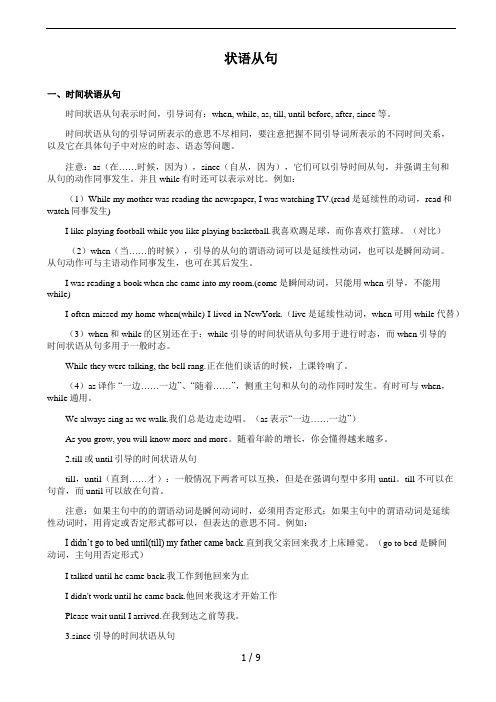
状语从句一、时间状语从句时间状语从句表示时间,引导词有:when, while, as, till, until before, after, since等。
时间状语从句的引导词所表示的意思不尽相同,要注意把握不同引导词所表示的不同时间关系,以及它在具体句子中对应的时态、语态等问题。
注意:as(在……时候,因为),since(自从,因为),它们可以引导时间从句,并强调主句和从句的动作同事发生。
并且while有时还可以表示对比。
例如:(1)While my mother was reading the newspaper, I was watching TV.(read是延续性的动词,read和watch同事发生)I like playing football while you like playing basketball.我喜欢踢足球,而你喜欢打篮球。
(对比)(2)when(当……的时候),引导的从句的谓语动词可以是延续性动词,也可以是瞬间动词。
从句动作可与主语动作同事发生,也可在其后发生。
I was reading a book when she came into my room.(come是瞬间动词,只能用when引导,不能用while)I often missed my home when(while) I lived in NewYork.(live是延续性动词,when可用while代替)(3)when和while的区别还在于:while引导的时间状语从句多用于进行时态,而when引导的时间状语从句多用于一般时态。
While they were talking, the bell rang.正在他们谈话的时候,上课铃响了。
(4)as译作“一边……一边”、“随着……”,侧重主句和从句的动作同时发生。
有时可与when,while通用。
We always sing as we walk.我们总是边走边唱。
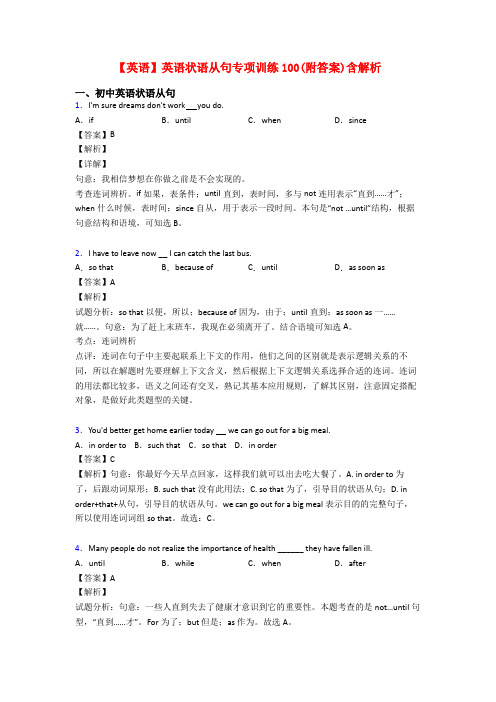
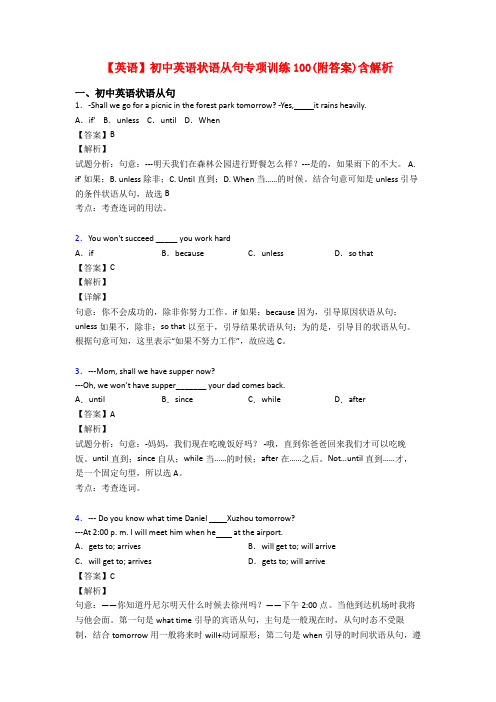
【英语】初中英语状语从句专项训练100(附答案)含解析一、初中英语状语从句1.-Shall we go for a picnic in the forest park tomorrow? -Yes, it rains heavily.A.if' B.unless C.until D.When【答案】B【解析】试题分析:句意:---明天我们在森林公园进行野餐怎么样?---是的,如果雨下的不大。
A. if' 如果;B. unless 除非;C. Until直到;D. When当……的时候。
结合句意可知是unless引导的条件状语从句,故选B考点:考查连词的用法。
2.You won't succeed _____ you work hardA.if B.because C.unless D.so that【答案】C【解析】【详解】句意:你不会成功的,除非你努力工作。
if如果;because 因为,引导原因状语从句;unless如果不,除非;so that以至于,引导结果状语从句;为的是,引导目的状语从句。
根据句意可知,这里表示“如果不努力工作”,故应选C。
3.---Mom, shall we have supper now?---Oh, we won’t have supper_______ your dad comes back.A.until B.since C.while D.after【答案】A【解析】试题分析:句意:-妈妈,我们现在吃晚饭好吗? -哦,直到你爸爸回来我们才可以吃晚饭。
until直到;since自从;while当……的时候;after在……之后。
Not…until直到……才,是一个固定句型,所以选A。
考点:考查连词。
4.--- Do you know what time Daniel Xuzhou tomorrow?---At 2:00 p. m. I will meet him when he at the airport.A.gets to; arrives B.will get to; will arriveC.will get to; arrives D.gets to; will arrive【答案】C【解析】句意:——你知道丹尼尔明天什么时候去徐州吗?——下午2:00点。

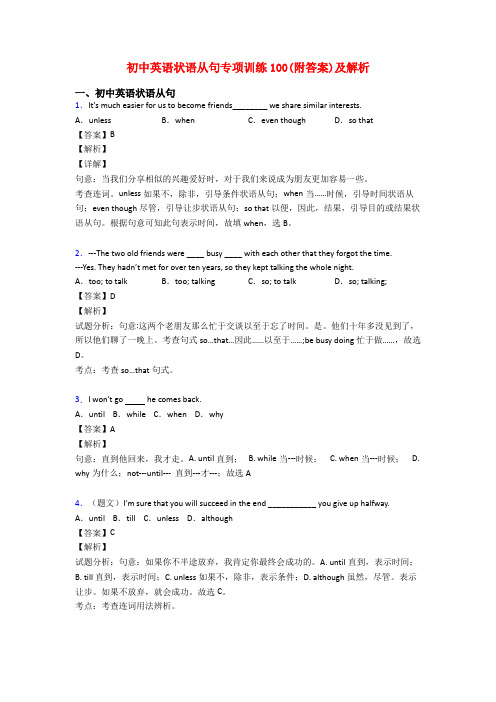
初中英语状语从句专项训练100(附答案)及解析一、初中英语状语从句1.It’s much easier for us to become friends________ we share similar interests.A.unless B.when C.even though D.so that【答案】B【解析】【详解】句意:当我们分享相似的兴趣爱好时,对于我们来说成为朋友更加容易一些。
考查连词。
unless如果不,除非,引导条件状语从句;when当……时候,引导时间状语从句;even though尽管,引导让步状语从句;so that以便,因此,结果,引导目的或结果状语从句。
根据句意可知此句表示时间,故填when,选B。
2.---The two old friends were ____ busy ____ with each other that they forgot the time.---Yes. They hadn’t met for over ten years, so they kept talking the whole night.A.too; to talk B.too; talking C.so; to talk D.so; talking;【答案】D【解析】试题分析:句意:这两个老朋友那么忙于交谈以至于忘了时间。
是。
他们十年多没见到了,所以他们聊了一晚上。
考查句式so…that…因此……以至于……;be busy doing忙于做……,故选D。
考点:考查so…that句式。
3.I won't go he comes back.A.until B.while C.when D.why【答案】A【解析】句意:直到他回来,我才走。
A. until 直到; B. while当---时候; C. when当---时候; D. why为什么;not---until--- 直到---才---;故选A4.(题文)I’m sure that you will succeed in the end ___________ you give up halfway. A.until B.till C.unless D.although【答案】C【解析】试题分析:句意:如果你不半途放弃,我肯定你最终会成功的。
状语从句的分类一、时间状语从句时间状语从句表示时间,引导词有:when, while, as, till, until before, after, since等。
时间状语从句的引导词所表示的意思不尽相同,要注意把握不同引导词所表示的不同时间关系,以及它在具体句子中对应的时态、语态等问题。
注意:as(在……时候,因为),since(自从,因为),它们可以引导时间从句,并强调主句和从句的动作同事发生。
并且while有时还可以表示对比。
例如:(1)While my mother was reading the newspaper, I was watching TV.(read是延续性的动词,read和watch同事发生)I like playing football while you like playing basketball.我喜欢踢足球,而你喜欢打篮球。
(对比)(2)when(当……的时候),引导的从句的谓语动词可以是延续性动词,也可以是瞬间动词。
从句动作可与主语动作同事发生,也可在其后发生。
I was reading a book when she came into my room.(come是瞬间动词,只能用when引导,不能用while)I often missed my home when(while) I lived in NewYork.(live是延续性动词,when可用while代替)(3)when和while的区别还在于:while引导的时间状语从句多用于进行时态,而when引导的时间状语从句多用于一般时态。
While they were talking, the bell rang.正在他们谈话的时候,上课铃响了。
(4)as译作“一边……一边”、“随着……”,侧重主句和从句的动作同时发生。
有时可与when,while通用。
We always sing as we walk.我们总是边走边唱。
(as表示“一边……一边”)As you grow, you will know more and more。
随着年龄的增长,你会懂得越来越多。
2.till或until引导的时间状语从句till,until(直到……才):一般情况下两者可以互换,但是在强调句型中多用until。
till不可以在句首,而until可以放在句首。
注意:如果主句中的的谓语动词是瞬间动词时,必须用否定形式;如果主句中的谓语动词是延续性动词时,用肯定或否定形式都可以,但表达的意思不同。
例如:I didn’t go to bed until(till) my father came back.直到我父亲回来我才上床睡觉。
(go to bed 是瞬间动词,主句用否定形式)I talked until he came back.我工作到他回来为止I didn't work until he came back.他回来我这才开始工作Please wait until I arrived.在我到达之前等我。
3.since引导的时间状语从句Since(自从):引导的从句的谓语动词可以是延续性的动词,也可以是瞬时动词。
一般情况下,从句谓语动词用一般过去时,而主句的谓语动作用现在完成时。
但在It is+时间+since从句的句型中,主句多用一般现在时。
例如:I have been in Beijing since you left. 自从你离开以来,我一直在北京。
Where have you been since I last saw you? 自上次我和你见面以后,你到哪里去了?It is five months since our boss was in Beijing. 我们老板离开北京有五个月了。
4.由before和after引导的时间状语从句注意:(1)before(在……之前):引导的从句不再用否定的谓语。
(2)当主句用将来时,从句总是用现在时;如果before引导的从句谓语用的是过去时。
则主句动词多用过去完成时,这样以便体现动作发生的先后。
(3)after(在……之后):表示主句动作发生在从句动作之后。
如果主句用的是过去时,则从句多用过去完成时。
例如:It will be four days before they come back. 他们要过四天才能回来My father had left for Canada just before the letter arrived. 我父亲恰好在信到之前去加拿大了。
After we had finished the work, we went home. 完成工作之后,我们回家了(从句用过去完成时,主句用一般过去时)5.由as soon as ,immediately, directly ,instantly, the moment, the instant, the minute,等引导的时间状语从句:这些连词都表示“一……就”。
例如:I will go there directly I have finished my breakfast.吃完早饭,我立即到那里去。
The moment I heard the news, I went to the school. 我一听到消息,马上赶到了学校。
As soon as I reach Canada, I will ring you up.我一到加拿大,就给你来电话。
注意 hardly(scarcely,rarely)……when,before,no sooner …than相当于 as soon as之意。
主句用过去完成时,从句用一般过去时态。
当hardly,scarcely, rarely和 no sooner位于句首时,主句应用倒装语序。
例如:Hardly had I sat down when he stepped in ,我刚坐下,他就进来了。
二、原因状语从句原因状语从句表原因,常见的引导词有:because(因为),since(既然),as(既然),for (因为)1.becausey引导的原因状语从句一般放于主句之后,because表示直接原因,语气最强,回答why引导的疑问句必须使用because。
I do it because I like it..——Why didn’t he come yesterday?——Because he had something important to do.注意“not……because”结构中的not否定的是because引导的整个从句,例如:Thecountry is not strong because it is large.国强不在大.2.Since引导的原因状语从句一般位于主句之前,表示已知的、显然的理由。
通常被翻译成“既然”,较为正式,语气比because弱。
Since you are free today, you had better help me with my mathematics,既然今天你休息,你最好帮我补习数学。
3.as引导原因状语从句时表示附带说明的“双方已知的原因”,语气比since弱,较正式,位置较灵活,常放于主句之前。
As it is raining, you’d better take a taxi,既然在下雨,你最好乘出租汽车。
4. for引导的原因状语从句并不说明主句行为发生的直接原因,只提供一些辅助性的补充说明,for引导的原因状语从句只能放于主句之后并且必须用逗号将其与主句隔开。
He could not have seen me, for I was not there.他不可能见过我,因为我不在那里。
三、条件状语从句引导条件句常用的连词有if(如果),unless(如果不,除非)等,条件状语从句和时间状语从句一样,表示将来要用一般现在时态。
We won’t let you in unless you show your pass.If you fail again this time,what will you do?(1)if引导的条件状语从句表示将来时,要用一般现在时代替,主句仍使用一般将来时态。
(2)将if引导的宾语从句和状语从句进行混淆考查,宾语从句中的if表示“是否”,可以使用一般将来时。
四、让步状语从句让步状语从句表示“虽然,即使,尽管”。
引导词有although,though,even though, even if都表示“虽然,即使,尽管”之意。
主句中不能用but,但可用yet、Though和although语气较弱(其中的though比although通俗,不如although正式),evenif和even though带有强调意味而显得语气更强。
例如:Although they are poor ,they are happy yet.虽然他们很穷,但很快乐The article is very important though it is short.那篇文章虽然很短,但很重要。
Even though it was raining, she walked to work.即使下雨,她也是走着去工作的。
I’ll visit him this evening even if I can stay only a few minutes.今晚我将去拜访他,即使我只能停留一小会儿。
注意though引导的让步状语从句的用法比较特殊,它可以倒装,也可以不倒装。
五、地点状语从句地点状语从句常由where和wherever引导,通常可置于主句之前或之后。
如:We should go where(ver) we are most needed,我们要去最需要我们的地方。
Where there is a will, there is a way.有志者,事竟成。
六、目的状语从句目的状语从句通常由so that, in order that 引导,所引导的从句通常放在主句后面。
目的状语从句中的谓语常含有may (might),can (could),shall ,will 等情态动词。
如:He always takes a seat in the first row so that/in order that he can hear better.= In order that he can hear better, he always takes a seat in the first row.为了听得更清楚,他总是坐前排的座位。
七、结果状语从句结果状语从句常由so that, so…that, such…that等引导,放在主句之后,so…that与such…that句型在一定条件下可转换。